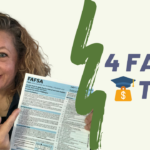
Blog: 4 Reasons to Hire a Fee-Only Financial Planner
Hiring a financial planner is a big step and you might want to consider hiring a fee-only financial planner. You’ll want to find someone you can trust and who will be your advocate for your current and future self.
Read on for four reasons why a fee-only financial planner might be your best choice:
Reason One: Fee-only financial planners do not make money on commissions.
When a financial advisor gets paid by commissions on products sold, their incentives may become skewed. Many “financial advisors” are incentivized to sell you insurance, annuities, or investment products that you may not really need or are not good for you.
Expensive life insurance products are being sold to young marine service members and others who don’t need them and can’t really afford them. My business partner used to work for a large financial services company in his 20s. They were pushing him to sell disability insurance since that’s where they can rake in higher commissions. Never mind that some of these clients already have disability insurance coverage through work and may not need an extra policy at all.
Reason Two: Fee-only financial planners are transparent with their fees.
With fee-only financial planners, you know exactly what you’re paying. No hidden fees or commissions.
Traditional fee-only financial planners charge based on a percentage of assets that they manage. The typical fee is 1% of assets.
The more modern fee-only financial planners will charge a flat fee: either upfront (e.g. $1,500 to $4,000) or hourly (e.g. $200 to $400 an hour) or a flat retainer fee paid monthly or annually (e.g. $2,000 to $8,000). This fee schedule has been gaining popularity with Generation X and Millennials because a) it’s transparent; b) it allows them to hire a financial planner even with minimal assets, and c) they won’t get charged an arm and a leg once they have built a substantial amount of wealth.
Reason Three: Fee-only financial planners are not tied to a specific company, so they are free to provide a wide array of solutions.
If you work with a big box financial services firm, most likely the financial advisor will be encouraged to recommend mutual funds tied to that firm. And often, they won’t be the best option out there.
A fee-only financial planner can look at all available solutions in the marketplace and can recommend the best one for you.
Reason four: Fee-only financial planners act as a fiduciary, prioritizing your interests above their own.
The whole point of hiring a financial advisor is so that you can maximize your money and have it aligned with your goals and dreams. It’s easier to trust someone if they have sworn an oath to act in your best interest. You trust that your doctor is primarily concerned about your health because your doctor has a fiduciary responsibility.
Now that you know to look for a fee-only financial planner, are they worth it? Watch this video to find out if financial planners are actually worth hiring.









Engage us on Facebook
Follow us on Twitter
Tweets by @mymcmedia